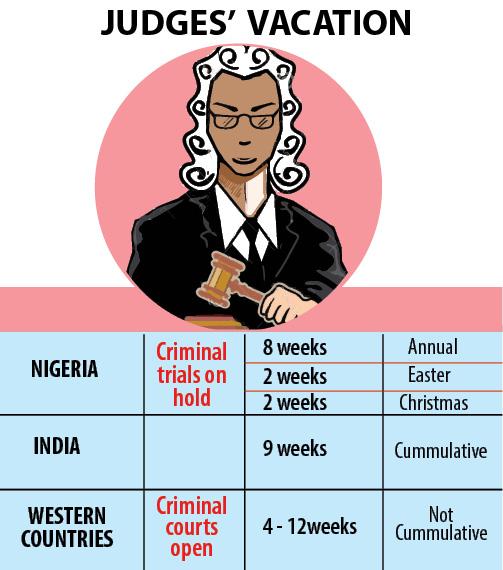It was like any other day at the Supreme Court, Abuja. The apex court was in session and cases were called for hearing but when this particular case was called up, the court was informed that all the parties in the appeal – both appellants and respondents- were dead.
It is a notorious fact that Nigerian judges face enormous challenges. Due to lack of proper infrastructure and difficult working conditions many judges often extend their official working hours into their private time in order to meet the exigencies of their respective dockets.
Yet, in spite of these challenges, there are also important considerations. So much of what the public and the country expect of the judiciary is not being met at this time, and this has created significant agitation among court users and Nigerians in general, ultimately reducing the level of trust placed in this arm of government. Some cases are as old as 45 years or more in court dockets with no serious sign of final resolution.
Judges, according to Prof. Itse Sagay (SAN), should cut down on holidays and be more sensitive about their role in the society and be more concerned about the fate of parties in the cases who want their cases heard at a certain date.
“There are a lot of problems so we have to think of the people of this country, and the services judges are delivering as one major area of government and be proud of what they are doing. As it is now they cannot be proud and we are not proud of what they are doing; none of us is proud of what is going on because cases are taking so long and it is scandalous when cases take over 20 years.
“The Supreme Court is so congested that if you file a case now, don’t expect it to be heard in the next five years. For me it is a failed system that is run now and the CJs, NJC and all top judges should meet and think of a way out”, Sagay, a professor of law, said.
He suggested that judges should have young, brilliant lawyers attached to them and do their research and even write the preliminary judgment which the judge will now improve upon.
Given the many frustrations that litigants have expressed with chronic court delays, and the overall performance of the judiciary, Access to Justice (A2J), a non-profit organisation, said there is urgent need for review of the lengthy vacation period that superior court judges are entitled to for the prosperity and efficiency of our justice system
Early in July this year, many courts, including the Federal High Court and many state courts went on recess. Although the period varied from jurisdiction to jurisdiction, the vacation which has just ended lasted for about 8 weeks.
Most cases before courts will recommence after the vacation period, even though provisions were generally made for a few vacation judges who handled emergencies, as they sat throughout the vacation period. This recess is, however, not the only vacation superior court judges are entitled to. They also go on recess for 2 weeks at Easter and 2 weeks at Christmas time. In total, Nigerian courts are generally closed for vacation for about 12 weeks.
Despite the two months long vacation period, one week is also set aside for the Nigerian Judges Conference, which follows immediately after the long vacation.
The Nigerian (superior court) judiciary, according to A2J enjoys one of the lengthiest vacation systems in the world. “and that, Nigeria has some of the most intractable problems of court delays, among its peers around the world. As such, any effort to reduce prolonged trial delays must address the availability of judges to sit in courts, at all times. The conundrum of access to courts in Nigeria is widespread, and requires urgent attention, and the Judiciary has never quite been able to surmount this problem, in spite of some modest efforts to do so.
Court delays, according to A2J, partly account for the excessively high awaiting trial and prison congession, with roughly 70 per cent of prison inmates, in this category.
Long court vacations jeopardize the fair trial rights of persons who are in prison custody and are undergoing trial, or persons who are not entitled to bail, or have not been able to meet bail terms.
Given the public interest in the timely disposition of corruption cases, there is an urgent need to reform how judges handling the cases should break for vacation.
Adetokunboh Mumuni, executive director, SERAP, said lengthy vacation has been there since the colonial period, adding that in judiciaries all over the world, vacations are taken.
“What I don’t want is the use of precious judicial time in attending conferences and doing valedictory services. What I would prefer would be, if there would be conferences put it at 4pm and any other ceremonies you can put at weekends. That to me is the appropriate thing to do because any system is about the people”.
In most Western countries, superior court judges go on leave for between 4 to 12 weeks a year. During the vacation period, however, the criminal justice system is not put in abeyance. Many countries ensure that judges’ holidays are staggered and not cumulative to make sure that the justice system remains in service all through the year. Some countries have abolished general court recess altogether to ensure the efficacy of their criminal justice system and guarantee the protection of fair trial rights for their citizens. In India, for instance, which shares some social characteristics with Nigeria, judges go on recess for only 9 weeks cumulatively.
Stakeholders suggested that the National Judicial Council (NJC) as part of its reform agenda should re-enliven public trust and confidence in the judiciary by immediately adopting policies limiting the amount of vacation time of judges to 9 weeks cumulatively, and particularly changing vacation procedures so that all criminal courts run continuously throughout the year.




